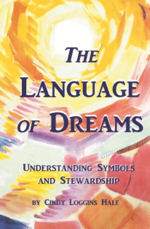by Cindy Hale
I have always been a vivid dreamer and a visual learner.
The stories of dreams in the Bible always fascinated me, with their strange images and symbolism leading to such profound and true interpretations.
I was curious about my own dreams and what they could possibly mean.
Existing Books on Interpreting Dreams Were Disappointing to Me
My background in music and literary analysis probably contributes to my interest in dreams, as they are both topics involving similar skills. Events occurring in my life often reminded me of things I had previously dreamed about, so I became increasingly curious about the topic.
Library books I read on the subject were less than satisfying to me in furthering my understanding, as they did not have a very solid spiritual foundation upon which to understand one’s dreams. There seemed to be innumerable ways to go wrong on an interpretation—but I wanted to learn how to do it right.
The books I read seemed weird, casting a worldly, over-sexualized and cynical view on what I felt was a more serious, sensitive spiritual topic.
For example, even the best websites I could find several years ago on the topic were covered with ads depicting occult subjects or people aiming to market to mentally or emotionally unstable individuals.
That was a real turn-off to me—and I would imagine, to anyone seeking greater understanding on the topic.
So, I continued studying scriptural accounts and what spiritually grounded advice I could glean elsewhere.
I Felt I Needed to Write More and Publish a Book
In 2014, after returning from mission service with my husband, I felt I needed to write more and to publish a book.
Since there was still a lack of solid material on the subject of dream interpretation, I felt I could perhaps elevate the conversation a bit to something that would actually benefit a spiritually discerning person.
During the two years it took me to finish The Language of Dreams, I saw the complete fulfillment of a very detailed and emotionally powerful dream that came to me only once in about 1993, which I wrote down and remembered because it seemed so important at the time.
This dream was full of unusual symbols I had not experienced in my life before. As the years passed, each of those symbols appeared in my actual life, in sequence.
Details of this dream are found in the book, there is not room for it here; suffice it to say that the dream became a touchstone for me, a reassurance that things would be ok.
Every now and then over the years, another symbol would appear at a critical time, bringing relief. The ending view of the dream is what I now see when I look out my kitchen window—after 25 years, multiple moves, a new marriage and a way of life vastly different from where I started.
Who Was I to Write This Book?
Perhaps the biggest roadblock in writing this book was what is called in the business world “impostor syndrome”—what “authority” did I have to write a book on dream interpretation?
I don’t have degrees or certification in psychology or in other commonly associated “official” authorities on dream interpretation.
But what I did have was a solid foundation in the scriptures, a natural curiosity on a rather off-the-wall topic, a lifetime of challenging experiences that taught me what I didn’t need as well as what I needed to know about it, and an ability to organize my own system of interpretation using the information at hand.
So I began.
As time has gone by, it has been gratifying to now have the support and enthusiasm of a highly qualified, spiritually sound mental health professional, who loves my book and shares it every chance she gets.
Editing My Book Was a Tremendous Learning Experience
Writing The Language of Dreams was actually not so difficult; it was good to get it started.
Editing after I finished, however, was much more challenging. Organizing the book was exhausting and frustrating, in part because I still felt like an impostor.
I enlisted the help of others. One woman was willing to help, but could not figure out how to edit my disorganized mess of a first draft. She simply quit, and it was rather humiliating.
Another was more encouraging. She corrected a few grammatical errors, offered a few organizational suggestions, and gave the manuscript back. She told me I was a good writer—and I clung to that encouragement.
Several more drafts were required before the book was fit to publish, but the process was a tremendous learning experience.
The process of writing a book is not always a straight line, start to finish. I started out with a purpose that was insufficient to what the book itself needed to become, but I only understood that as I wrote it.
So there had to be some time spent on redefining and upgrading my vision of it.
We Often Fight Against the Things that Scare Us
Dreams fall into that realm of thought that is a little beyond the conscious—so they are sometimes scary for people.
We often fight against the things that scare us. People take a dream literally, and that shocks and frightens them.
Dreams are almost always symbolic—and perhaps a little overdramatic, as well, so they will get our attention. When you get to the bottom of that horrifying literal dream event, the meaning is usually something much more benign—but useful.
Once you get a better idea of the symbolic patterns of dreams—which are not that different from person to person—it takes the fear out of the equation, allowing curiosity and wonder to flourish, and spiritual understanding to grow.
It Has Taken a Lifetime to Understand Who I Really Am
It is my feeling that the better you become familiar with God and understand yourself, the better you are able to understand the world around you.
It has taken me a lifetime to even scratch the surface of understanding who I really am.
Exploring my dreams using the Scriptures as a guide has been a fantastic vehicle for doing so. The comfort, strength and uplift I have received through interpreting dreams has been exponentially greater than anything gained merely from the literal dreams themselves.
The interpretation process requires you to explore your true motivations, your relationships and your process of integrating all of those things—and it is a profoundly healthy thing to do. It is well worth the time invested.
It also opens you up to strength beyond your own, as you seek to understand and connect with a higher understanding.
Advice for a Young Writer: Just Start
Just start.
You don’t have to have letters after your name. You don’t have to be anything more than who you are right now.
Your experiences and your viewpoint can help others.
If you have a desire to write, then you should write—and get published in one way or another. The world needs you, and as you prayerfully persist, a way will be opened. I hope to assist others with the publishing process.
* * *
 Cindy Hale, the owner of Keithley Creek Publishing, LLC, is a happy wife, mother and survivor. She enjoys her large family, her farm, her work, and her hobbies of music, art and of course, writing. She lives in rural Idaho with a 360-degree view of the surrounding hills.
Cindy Hale, the owner of Keithley Creek Publishing, LLC, is a happy wife, mother and survivor. She enjoys her large family, her farm, her work, and her hobbies of music, art and of course, writing. She lives in rural Idaho with a 360-degree view of the surrounding hills.
For more information on Cindy and her work, please see her website or Facebook Author Page or connect with her on Twitter or LinkedIn.
 The Language of Dreams: Understanding Symbols and Stewardship: From ancient times, people all around the world have considered dreams to be messages or instruction from an inner or higher power.
The Language of Dreams: Understanding Symbols and Stewardship: From ancient times, people all around the world have considered dreams to be messages or instruction from an inner or higher power.
Many people even today believe dreams carry messages to the dreamer.
The Language of Dreams outlines an interesting, scripture-based method of dream interpretation, connecting modern readers with ancient traditions and elevating the conversation on interpreting dreams from woo-woo and weird to WOW!
Available from Keithley Creek Publishing and at Amazon.


I’m also fascinated by the topic of dreams. I kept a dream journal in 2018 and it was interesting not only to observe the various scenarios and sometimes patterns occurring in my dreams, but also the factors influencing if and when I was even able to remember my dreams and to what extent. The subconscious mind is so intriguing. I doubt we know the nth percent of its purpose and function.